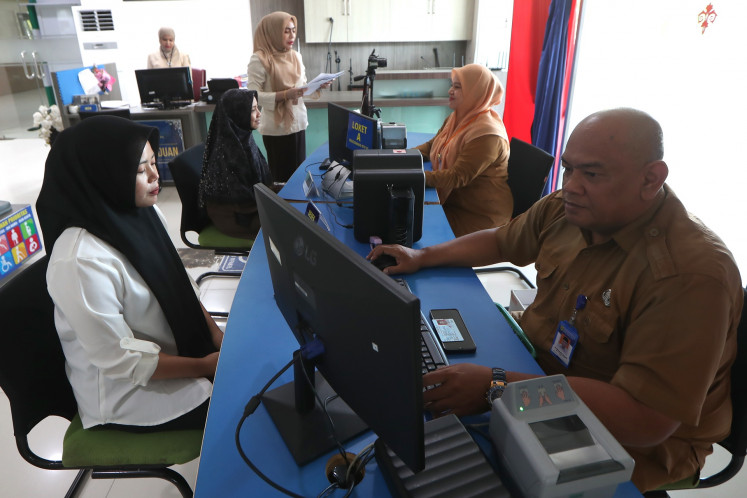Popular Reads
Top Results
Can't find what you're looking for?
View all search resultsPopular Reads
Top Results
Can't find what you're looking for?
View all search resultsBiomedical approach not enough to tackle childhood stunting
The high prevalence of stunting in Indonesia has driven the government, in collaboration with the Australian government and Nutrition International, to launch a joint program focusing on the distribution of micronutrients in East Java and East Nusa Tenggara (NTT)
Change text size
Gift Premium Articles
to Anyone
T
he high prevalence of stunting in Indonesia has driven the government, in collaboration with the Australian government and Nutrition International, to launch a joint program focusing on the distribution of micronutrients in East Java and East Nusa Tenggara (NTT).
Experts, however, say this biomedical approach is insufficient.
Due to the still high prevalence of anemia, the government has created a project called BISA that will be first applied in West Java and NTT in April 2020.
The program will reinforce the distribution of iron supplements among teenage girls in schools that will increase red blood cell counts.
"In 2019, the number of people with the risk of stunting in Indonesia was still considered high at 27.7 percent. Meanwhile, East Nusa Tenggara was still the province with the highest number of stunting at 42.6 percent last year, which means four out of 10 children in the province have a high risk of stunting. Also East Java with 32.8 percent, which means three to four out of 10 kids have the potential for stunting," said Kirana Pritasari, the director general of public health at the Health Ministry.
According to her, the high average number of stunting in those two provinces was the reason for the micronutrients pilot program applied in 20 cities in both provinces since 2016.
The micronutrients distribution program, which was initiated by the Australian government, the Canadian government and Nutrient International, contributed to the vast distribution of iron supplement tablets to prevent anemia among women and vitamin C and vitamin A for toddlers.
"This program, which has been running since 2016 is very important as it is in line with our national priority program to reduce the cases of stunting in Indonesia. That is why the program needs to be integrated and the health management plan needs to be improved in the future," Kirana added.
The 2018 Basic Health Survey (Riskesdas) showed the prevalence of underweight children stood at 17.7 percent while stunting among children was 30.8 percent. Meanwhile, for acute malnutrition or wasting, the report showed 10.2 percent.
The World Health Organization (WHO) expert committees since 1993 has categorized prevalence ranges, grouping them into low (less than 20 percent), medium (20-29 percent), high (30-39 percent) and very high (more than 40 percent). Meanwhile, wasting below 5 percent was considered as acceptable, around 5-9 percent was deemed poor, between 10 and 14 percent was considered serious and more than 15 percent was considered as critical.
Based on the WHO prevalence range, Indonesia’s stunting and wasting numbers in 2018 were still categorized as high and serious. According to the WHO, stunting is linked to many factors, among them are inadequate nutrition and anemia in women of reproductive age.
The 2018 Riskesdas also showed an increase in anemia cases among teenage girls from 37.1 percent in 2013 to 48.9 percent in 2018. The biggest prevalence figure was in the group aged 15 to 24 years old and was followed by the group aged 25 to 34 years old.
Meanwhile, the anemia cases among pregnant women aged 15 to 24 was quite high at 84.6 percent, and 33.7 percent for those aged 25 to 34 years old.
BISA program deputy chief Don Marut said the iron supplementation was a program enforced by UNICEF for the past 15 years, however, he admitted the program did not run well in Indonesia. According to him, people's ignorance about health issues was not monitored and corrected by the government, which also neglected the stunting issue.
"For example in East Nusa Tenggara, sanitation is not the only problem. People’s behavior, such as walking barefoot to many places is the main factor in pinworm infection, which absorbs nutrients from the human body. The trend of child marriages in West Java province will further cause child negligence or poor child caretaking. These problems are linked to stunting. Yet, the government does little to address these problems," he told The Jakarta Post.
Nevertheless, according to him, the initiation of the five-year project by the government in collaboration with Nutrient International, which will first take place in Sumedang and West Bandung regencies in West Java needed to be applauded.
Similar to Don Marut, nutritionist and lecturer in the Department of Nutrition at the University of Indonesia, Rina Agustina, also said that the red blood cell booster tablets for teenage girls would be an early investment to reduce the potential risk of stunting among children.
"The problem with stunting is that the stunted children tend to grow up as stunted adolescents with an anemic condition. It's like a vicious circle if the anemic condition continues until these girls [grow up, get married] and get pregnant, because it can be confirmed that the baby will most likely be stunted. It becomes a trans-generation problem," she told the Post.
However, Rina criticized the old-fashioned “one door” approach by the government in dealing with the stunting issue.
"The biomedical approach is not enough. We also need to examine an environmental approach, a psycho-social approach, economic conditions and socio-cultural issues," she said.
According to Rina, most teenage girls and pregnant women are unaware about healthy lifestyles, for example their high frequency of eating junk food, ignorance about blood booster tablets, or simply not going to integrated health services posts (Posyandu) during pregnancy. Nevertheless, she added, that the onus was on the government, which never sees these as problems that need to be approached effectively.
"The government only provides tablets, but they don't really monitor the consumption behavior. In another case, there are never any child-caretaking lessons given to married couples expecting children. Also, the function of midwives at the Posyandu is never optimized through the benefits of digital advancement," Rina said.
"The blood booster tablets for teenage girls at school is also insufficient to solve the problem as there are millions of girls who do not go to school. They are also exposed to anemic conditions. Poverty might force them into child marriage, which mostly contributes to poor child caretaking because of emotional unpreparedness and a lack of knowledge," she added.
Zumrotin, chairwoman of the Women's Health Foundation, also criticized the government approach, which ignores the role of men in the prevention of stunting.
"The government has taken many measures toward women such as blood booster tablets, various vitamins for pregnant women and so forth. It seems like the problem of stunting is only addressed to women. In fact, men also need to be educated on this issue. Because child negligence and domestic abuse can lead to stunting problems, this may be done by men," she said via phone. (trn)










